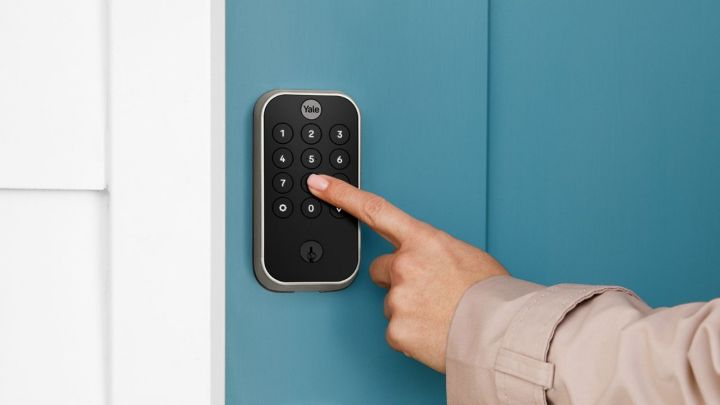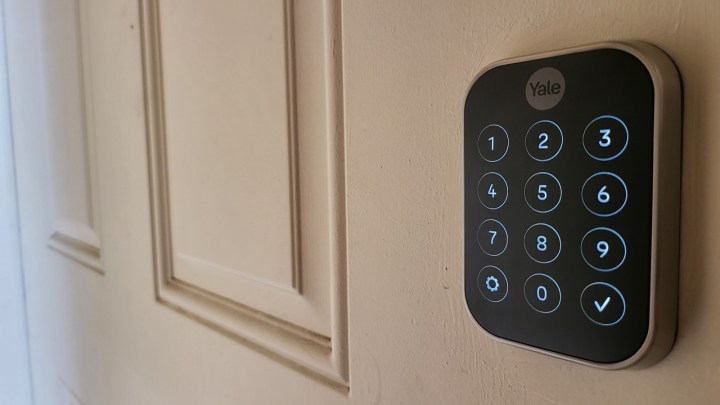“The Assure Lock 2 brings tons of features to your front door whether you’re at home or on vacation -- but it's a bit expensive.”
- Robust smartphone app
- Multiple available designs
- Gorgeous touchscreen
- Highly customizable performance
- Expensive
- Entry-level models lack important functionality
Yale is a big name in the world of locks, having crafted a wide variety of trusted products since it was founded in 1840. Although the company got its start with traditional locks, the manufacturer wasted no time in dipping its toes into the world of smart locks — and its latest creation, the Yale Assure Lock 2, is one of the best smart locks on the market.
With a slick design, an easy installation process, a powerful smartphone app, and multiple available models, the Yale Assure Lock 2 is a premium smart lock that doesn’t cut any corners. It’s a bit pricey — and the best features are restricted to the Wi-Fi models — but anyone seeking a well-rounded smart lock should have the Assure Lock 2 at the top of their list.
Quick installation process

The worst part of any smart lock is always the installation process. Removing your old deadbolt and fitting the Assure Lock 2 is no different, although it’s about as painless as it gets for these kinds of projects. Yale has included detailed instructions that use both a traditional instruction manual and your smartphone to streamline the process.
For me, the most difficult part was removing my current smart lock — I’d long since lost the instructions, and simply resorted to removing every screw I could find. After a bit of struggling, the smart lock popped off, and I could officially begin the Assure Lock 2 installation.
It’s a rather standard process, and thanks to incredibly detailed instructions (and an included ruler to help measure the width of your door), you’re never left wondering if you’ve correctly performed your current step.
All told, it only took around 30 minutes to get the Assure Lock 2 installed.
After installing the deadbolt and keypad, the Assure Lock 2 gives you the option to install one of two different door sensors. These monitor the door’s position and give you alerts when it’s left ajar. The easiest sensor to install is one that simply screws into the frame of your door next to the deadbolt — the pill-shaped device looks a bit funky, but it took all of two minutes to get positioned and installed.
The other option requires you to drill a small hole on the inside of your door frame before placing a small, circular sensor in the cutout. It’ll be completely out of sight when the door is closed, but it requires a few extra minutes of your time. I wasn’t comfortable drilling into my crumbling, 50-year-old frame, so I opted for the easier solution.
Since I was sent the Assure Lock 2 Touchscreen with Wi-Fi, I had one extra step after installing the deadbolt and door sensor — getting it hooked up to my network. The process is as simple as clicking a few buttons in the smartphone app and entering your Wi-Fi password.
All told, it took around 30 minutes to get the deadbolt installed, the sensor set up, and everything connected to Wi-Fi.
Impressive designs

Since your smart lock will be one of the first things visitors to your home notice, you’ll want it to look sleek and stylish. The Yale Assure Lock 2 is offered in three different colors (black, bronze, and satin nickel) and several different formats (touchscreen or keypad and keyed or key-free), making it easy to find something that fits in with the rest of your home.
Best of all, every single model looks stunning. My review unit was a key-free touchscreen model in Satin Nickel, and it’s difficult to understate its premium appearance. The touchscreen is a particular standout, as it offers a variety of striking effects (such as lights that oscillate down the keypad when locking and optional sound effects when pressing buttons) and is incredibly responsive to even the lightest touch.
The touchscreen is surrounded by a round design that cuts out all fluff and is much thinner than the outgoing Assure Lock SL. Aside from the touchscreen, the only discernible feature on the Assure Lock 2 is a set of prongs on the bottom that can be used during emergencies to recharge the smart lock with a 9-volt battery. And since this model doesn’t come with a keyhole, that gave me peace of mind that I wouldn’t get locked out if the batteries suddenly ran out of juice while I’m on vacation.
Top-of-the-line software

Yale backs up the Assure Lock 2’s good looks with a comprehensive set of features. From its smartphone app, you’ll have the ability to set up a permanent password, create guest profiles with temporary passwords, check the status of the door (open or closed, locked or unlocked), remotely lock or unlock the door, or even enable an auto-lock option that will lock the door behind you. You can even set it to unlock when you approach with your smartphone — granting you easy access if you have an armful of groceries and can’t be bothered to type in a code.
Another cool feature is the activity feed, which tracks when the door is opened, closed, locked, and unlocked. Many folks probably won’t bother to use the feed, but it’s useful if you want to keep tabs on your home while away on vacation (or check that your teenager is making it home before curfew).
You can upgrade the $160 Bluetooth-only models with the Wi-Fi Smart Module at a later date.
However, some of this functionality is lost if you don’t pick up a Wi-Fi-enabled Assure Lock 2. Opting for the standard Assure Lock 2 will still let you connect via Bluetooth to set up multiple passwords and profiles, but without the Wi-Fi smart module, you won’t be able to remotely lock or unlock your door or check on its status when away from home. And quite frankly, those capabilities are half the reason this lock is so compelling — making it all but a necessity to spring for the pricey Wi-Fi models.
If you can’t fit a $240 smart lock into your budget today, you can upgrade the $160 Bluetooth-only models with the Wi-Fi Smart Module at a later date. This will grant you all the features found on the Wi-Fi-enabled Assure Lock 2, as well as the option to upgrade your smart lock, which is a nice perk for shoppers on a budget. The module will set you back $80, which brings your total spending in line with the Wi-Fi models. In other words, you don’t have to pay a premium for upgrading.
Yale is eventually going to launch a Z-Wave Plus Smart Module, which will allow the smart lock to communicate with SmartThings, Ring, Arlo, ADT, and other popular products. When it launches, it’s expected to cost $80 — a steep price that only die-hard smart home enthusiasts will likely pay.
For integration with the industry-standard Amazon Alexa, Google Home, and Apple HomeKit, you’ll only need the standard Smart Module that’s included with Wi-Fi-enabled models. If you don’t get a Wi-Fi-enabled model, you’ll only get support for Apple HomeKit.
Add the Yale Assure Lock 2 to your shopping list

I’ve been using the Yale Assure Lock 2 for about a month now, and I haven’t stumbled upon a single major issue. Sometimes it’ll take a few moments for my smartphone to sync with the lock when I’m away from home, and the door sensor installed on the frame looks a bit quirky, but those are minor complaints compared to its features.
The big issue with the Assure Lock 2 is its price. There’s no doubt that the smart lock brings a ton of functionality to the table (along with a sleek footprint), but the $160 base model’s lack of Wi-Fi support really pushes you to the $240 Wi-Fi model. If price is no issue, then you’ll find the Assure Lock 2 to be one of the best smart locks available.
If you’re looking for something that’s as elegant as it is functional, there’s not much that competes with the Assure Lock 2.
Functional and stylish, there are only a handful of competitors for the Assure Lock 2. The August Wi-Fi Smart Lock is a perennial favorite, granting you remote access to your door without the need to swap out your hardware. It’s also a bit cheaper than the Yale Assure Lock 2, but it lacks a keypad (although you can purchase one separately).
If you’re in the market for something more affordable, the Wyze Lock is a better option. It clocks in at just $130 (a much lower price than even the cheapest Assure Lock 2), and it gives you Wi-Fi support right out of the box. But if you’re looking for something that’s as elegant as it is functional, there’s not much that competes with the Assure Lock 2.





